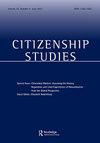Gated citizenship
IF 1.9
3区 社会学
Q3 POLITICAL SCIENCE
引用次数: 1
Abstract
ABSTRACT In The Birthright Lottery, I explored how birthright access to citizenship operates as a distributor (or denier) of opportunity on a global scale. Today, 97 percent of the global population gains access to citizenship solely by virtue of where or to whom they are born. This article shifts the gaze from the automatic transmission of citizenship (which I call the initial allocation), to deciphering the code, or underlying logic, that governs the secondary allocation: the process of naturalization. Counter to predictions of waning sovereignty, tremendous investment is placed on regulating mobility, migration, and access to membership. I identify three core sorting mechanisms that produce overt and covert inequalities in the acquisition of citizenship, which I call the trinity of the territorial, the cultural, and the economic. These intersecting yet analytically distinct dimensions allow governments to develop sophisticated ways to ‘filter’ admission of different populations, placing a heavy burden on those seeking it. The discussion lays bare the mistaken assumption that we live in a world wherein mobility is purely chosen and easily available—irrespective of race, gender, class, power, and legal regulation. It further suggests ways of reinvigorating the political imagination for rewriting the rules governing access to membership.封闭的公民身份
摘要在《出生权彩票》中,我探讨了在全球范围内,作为机会的分发者(或否认者),获得公民身份的出生权是如何运作的。如今,全球97%的人口仅凭出生地或出生对象就可以获得公民身份。这篇文章将目光从公民身份的自动传递(我称之为初始分配)转移到破译支配二次分配的代码或底层逻辑:入籍过程。与主权减弱的预测相反,在监管流动性、移民和获得会员资格方面投入了大量资金。我确定了三种核心分类机制,它们在获得公民身份方面产生了公开和隐蔽的不平等,我称之为领土、文化和经济的三位一体。这些相互交叉但在分析上截然不同的维度使政府能够开发出复杂的方法来“过滤”不同人群的准入,给寻求准入的人带来沉重负担。这场讨论暴露了一种错误的假设,即我们生活在一个流动性纯粹是选择的,而且很容易获得——无论种族、性别、阶级、权力和法律法规如何。它进一步提出了重振政治想象力的方法,以改写关于加入的规则。
本文章由计算机程序翻译,如有差异,请以英文原文为准。
求助全文
约1分钟内获得全文
求助全文
来源期刊

Citizenship Studies
POLITICAL SCIENCE-
CiteScore
3.60
自引率
11.10%
发文量
85
期刊介绍:
Citizenship Studies publishes internationally recognised scholarly work on contemporary issues in citizenship, human rights and democratic processes from an interdisciplinary perspective covering the fields of politics, sociology, history and cultural studies. It seeks to lead an international debate on the academic analysis of citizenship, and also aims to cross the division between internal and academic and external public debate. The journal focuses on debates that move beyond conventional notions of citizenship, and treats citizenship as a strategic concept that is central in the analysis of identity, participation, empowerment, human rights and the public interest.
 求助内容:
求助内容: 应助结果提醒方式:
应助结果提醒方式:


